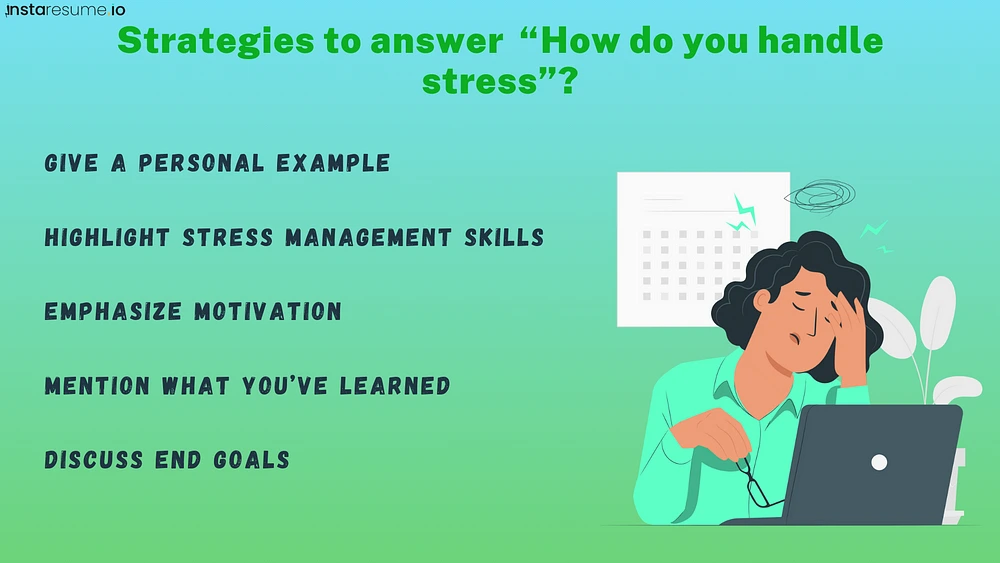Common interview questions series: How do you handle stress at work?

Photo by JESHOOTS.COM on Unsplash
In today's competitive job market, an interview is a crucial step toward landing your dream job. One question that frequently arises during interviews is, “How do you handle stress at work?” Your response to this question can reveal a lot about your ability to cope up with the demands of the job. In this blog post, we'll explore effective strategies for answering this challenging question in a professional manner.
The Significance of the “How Do You Handle Stress at Work” Question

How Do You Handle Stress at Work?
Behavioral interview questions like “How do you handle stress in work” are designed to assess your past experiences and behaviors. Hiring managers use these questions to predict how you might respond to stressors in the workplace. Therefore, it's vital to provide well-structured, thoughtful answers that showcase your ability to handle pressure.
Sample Responses
To answer the “How do you handle stress at work” question effectively, consider the following tips:
1. Give a Personal Example
Interviewers appreciate stories that demonstrate your work experience and your ability to handle stress. Instead of recounting a fairytale, share instances from your professional life.
An example response from the Project Manager: In my previous role as a Project Manager, handling stress effectively was paramount for the successful completion of complex tasks. One instance that stands out was when I faced a project with tight deadlines and the project scope kept on changing every day. There was a lot of miscommunication across the team about the deliverability of things. I created a thoughtful sheet of all the items to be delivered and prioritized them based on the best of my knowledge and then shared that document across teams to get their viewpoint on it. This way I kept every conversation in writing so that the scope never changed in conversations.
2. Highlight Stress Management Skills
Discuss the coping techniques you use to manage stress. Avoid mentioning unhealthy habits or ways that stress negatively affects you. Instead, focus on methods such as mindfulness, time management, and organization.
An example response from a Graphic Designer: “As a Graphic Designer, I thrive under pressure and deadlines. Stress often drives my creativity, leading to innovative solutions. Recently, I had to juggle multiple client projects with tight deadlines. I channeled the pressure into motivation and started picking up the projects which is most simplest to achieve and kept on completing them one by one rather than taking all projects at the same time.
3. Emphasize Motivation
Explain how pressure can motivate you to perform at your best. Share examples of how you've harnessed stress to meet deadlines or accomplish tasks more efficiently.
An example response from a Customer Service Representative: “In my role as a Customer Service Representative, effective stress management is essential in the fast-paced environment. When faced with challenging interactions, I proactively learn about our products and services, enabling me to provide quick, accurate solutions to customer queries. Open lines of communication with my team and customers also help me stay less stressed during these interactions.”
4. Mention What You've Learned
Stressful situations often teach valuable skills. Bring attention to the skills you've acquired through these experiences, such as time management, prioritization, organization, and diligence.
An example response from the content writer: As a Writer and Editor, stress and tight deadlines are part of the job. Recently, I had article deadlines moved up unexpectedly. I created a well-thought-out schedule and collaborated with the graphics team to ensure on-time delivery. The result was not only meeting all deadlines but also having one article become the most popular on our company website for the week.
5. Discuss End Goals
Explain how you use the end goal as motivation during stressful situations. By taking a step back and focusing on your ultimate objectives, you can navigate through the pressure of challenging projects more effectively.
A response from Managerial Position: In my experience as a Manager, I understand the importance of effective stress management. I believe in the power of proactive planning and strong communication. Staying well-versed in the products and services my team supports allows me to provide quick and accurate solutions. I encourage open communication and teamwork, ensuring that no one feels overwhelmed.
Mistakes to avoid in an Interview
To ensure your response to the “How do you handle stress in work” question is impeccable, avoid common pitfalls:
- Don't claim you don't get stressed; it lacks realism.
- Avoid discussing situations that could have been prevented.
- Refrain from labeling job duties as stressors, as this suggests you might not handle the basics of the job.
- Never state that you “just push through” without seeking help, as it implies a lack of communication.
- In management roles, don't overly emphasize delegation; instead, focus on teamwork and communication.
Conclusion
Handling the “How do you handle stress in work” question with professionalism and finesse can set you apart during job interviews. Sharing relevant examples, and emphasizing your stress management skills and motivation can demonstrate your suitability for the job. Avoid common interview mistakes to increase your chances of success. By mastering this question, you'll be well on your way to impressing potential employers and securing your desired role. Remember, interviews are not just about showcasing your skills; they're also an opportunity to exhibit your ability to thrive under pressure.

